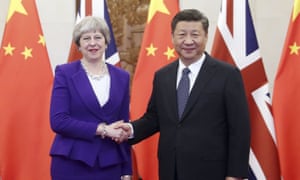Rana Mitter
 Last week, Donald Trump and Liu He, the Chinese vice-premier, signed phase one of a new trade arrangement between the US and China. The talks surrounding the agreement have been tortuous, leading to fears that the world could be caught up in a trade conflict between these two economic giants. The signing showed there is space for compromise as well as confrontation in dealing with China, but the negotiations illustrate the difficulties of dealing with a US that has embraced economic nationalism and a China whose markets are still restricted in many important areas.
Last week, Donald Trump and Liu He, the Chinese vice-premier, signed phase one of a new trade arrangement between the US and China. The talks surrounding the agreement have been tortuous, leading to fears that the world could be caught up in a trade conflict between these two economic giants. The signing showed there is space for compromise as well as confrontation in dealing with China, but the negotiations illustrate the difficulties of dealing with a US that has embraced economic nationalism and a China whose markets are still restricted in many important areas.
Nonetheless, as Britain prepares to leave the EU, there has been a resurgence of interest in the possibility of a major UK trade deal with Beijing. Just days after the 2016 referendum, the incoming Brexit secretary, David Davis, declared that “trade deals with the US and China alone will give us a trade area almost twice the size of the EU”.
A deal in exchange for pressure on politicians to avoid discussion of issues like Hong Kong would be too high a price for the UK
For now, just 3.5% of the UK’s exports go to China. We currently trade more with Ireland. Much of the £22bn-worth that we do sell to China is made up of vehicles, and medical and pharmaceutical products. Britain’s huge services economy still has only limited access to China. But China has the second-biggest economy in the world, and looks likely to remain a powerful economic magnet for exporters and investors for decades to come. Now that Brexit will happen within days, what are the chances of a trade deal with Beijing?
Few developed economies have a full free trade agreement with China, and those that do, such as Australia and Switzerland, usually have some particular product (minerals, specialist machinery) that makes such a deal attractive to Beijing. Instead, many countries have done bilateral, less comprehensive deals that cover only specific areas. The EU and China have been discussing a comprehensive FTA for years, but issues such as Chinese infringement of intellectual property rights has slowed down progress. The UK doesn’t have one obvious sector that China sees as of compelling benefit to its own interests, so a deal is unlikely to be agreed quickly.
However, this provides an opportunity for the UK to think carefully about what it wants from such a deal – and, just as important, how compatible it might be with future plans to trade with the US and the EU. The country may soon be forced into difficult choices.
A Hong Kong protest against China’s detention last year of former UK consulate employee Simon Cheng. Photograph: Chris McGrath/Getty Images
 At the moment, the government seems to be concentrating on a trade deal with the US, with its potential effects on NHS drug pricing or chlorinated chicken. But the US has another priority: to constrain the growth of China’s economy as far as possible, particularly in areas such as tech. The new US-Canada-Mexico trade agreement has a “poison pill” clause, which would allow the US to pull out if either of the other two countries signs a trade agreement with a “non-market” economy such as China. The US is likely to demand a similar clause in a US-UK agreement.
At the moment, the government seems to be concentrating on a trade deal with the US, with its potential effects on NHS drug pricing or chlorinated chicken. But the US has another priority: to constrain the growth of China’s economy as far as possible, particularly in areas such as tech. The new US-Canada-Mexico trade agreement has a “poison pill” clause, which would allow the US to pull out if either of the other two countries signs a trade agreement with a “non-market” economy such as China. The US is likely to demand a similar clause in a US-UK agreement.
Separately, in a more urgent decision, Washington is demanding that the Chinese firm Huawei is ruled out of bids to supply the UK’s 5G infrastructure. But if the UK agrees, it can expect an angry response from Beijing. At the moment, there are signs that the government will try to adopt a compromise position, allowing Huawei to bid for “non-core” infrastructure. Yet that runs the risk of satisfying neither the US nor China, rather than both.
The EU is also currently having its own debate about Chinese investment. In the past few months, Germany has become increasingly wary of the security implications of Chinese 5G technology. So the UK will shortly face a dilemma – if there is a split within the EU on how to engage with China, will we stay closer to the China-sceptic or the China-friendly parts of the continent?
Decisions of this sort make it an urgent priority to develop a deeper understanding in Britain of China and its thinking, including its very different political and social system. In the short term the UK should concentrate on strengthening sectors that already have a strong reputation in China, such as education. The UK is the top destination for Chinese university students after the US, bringing both income and an opportunity to promote the liberal, pluralistic values of free research and enquiry to China’s emerging elite.

Johnson will defy US and allow use of Huawei, says top security adviser
An eventual trade deal is possible but it depends on immensely skilled diplomacy as Britain weaves between the US, EU, and China. It will also require making a strong case to China that concessions to Britain, such as greater access for British financial and legal services, are worthwhile, while making a clear case at home that a deal with China will create tangible prosperity without compromising liberal values. A deal in exchange for pressure on politicians or the press to avoid discussion of issues such as the importance of maintaining judicial independence and a free press in Hong Kong would generally be considered too high a price.
In 2016 Davis argued that after Brexit, Britain should provide “an 0800 number that a small specialist manufacturer in the north of England, say, could call for practical help in Shanghai”. The infrastructure and knowledge base that would be needed for such a phone number to be feasible is still in its infancy. Developing it won’t be quick or easy. The challenge for advocates of “global Britain” is to now demonstrate that their confidence in acquiring new markets is not just bluster, and that they can draw the UK closer to a far-off economy about which we still know too little.
• Rana Mitter is director of the University of Oxford China Centre
As 2020 begins…
… we’re asking readers, like you, to make a new year contribution in support of the Guardian’s open, independent journalism. This has been a turbulent decade across the world – protest, populism, mass migration and the escalating climate crisis. The Guardian has been in every corner of the globe, reporting with tenacity, rigour and authority on the most critical events of our lifetimes. At a time when factual information is both scarcer and more essential than ever, we believe that each of us deserves access to accurate reporting with integrity at its heart.
More people than ever before are reading and supporting our journalism, in more than 180 countries around the world. And this is only possible because we made a different choice: to keep our reporting open for all, regardless of where they live or what they can afford to pay.
We have upheld our editorial independence in the face of the disintegration of traditional media – with social platforms giving rise to misinformation, the seemingly unstoppable rise of big tech and independent voices being squashed by commercial ownership. The Guardian’s independence means we can set our own agenda and voice our own opinions. Our journalism is free from commercial and political bias – never influenced by billionaire owners or shareholders. This makes us different. It means we can challenge the powerful without fear and give a voice to those less heard.
None of this would have been attainable without our readers’ generosity – your financial support has meant we can keep investigating, disentangling and interrogating. It has protected our independence, which has never been so critical. We are so grateful.
As we enter a new decade, we need your support so we can keep delivering quality journalism that’s open and independent. And that is here for the long term. Every reader contribution, however big or small, is so valuable.
No comments:
Post a Comment